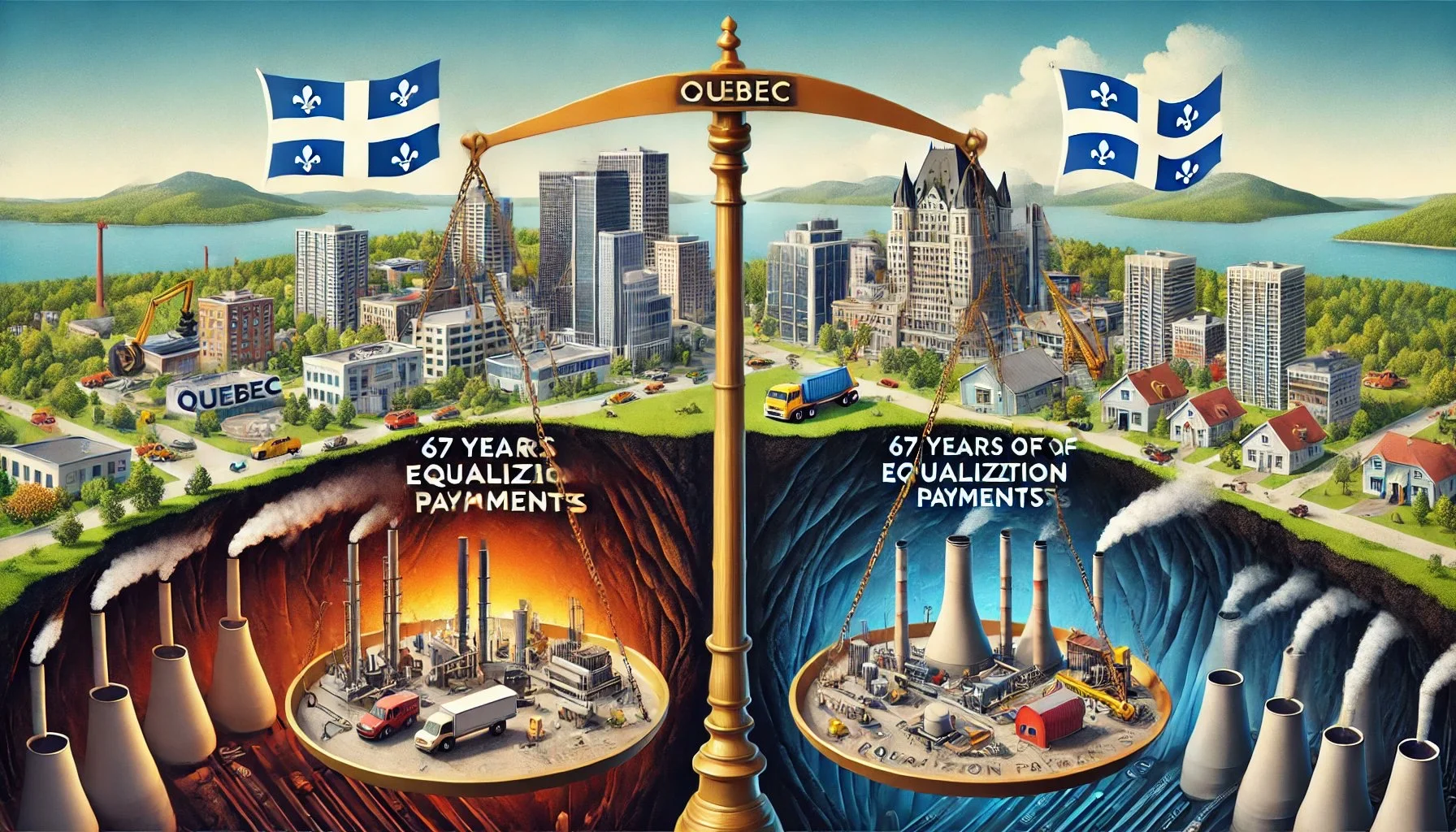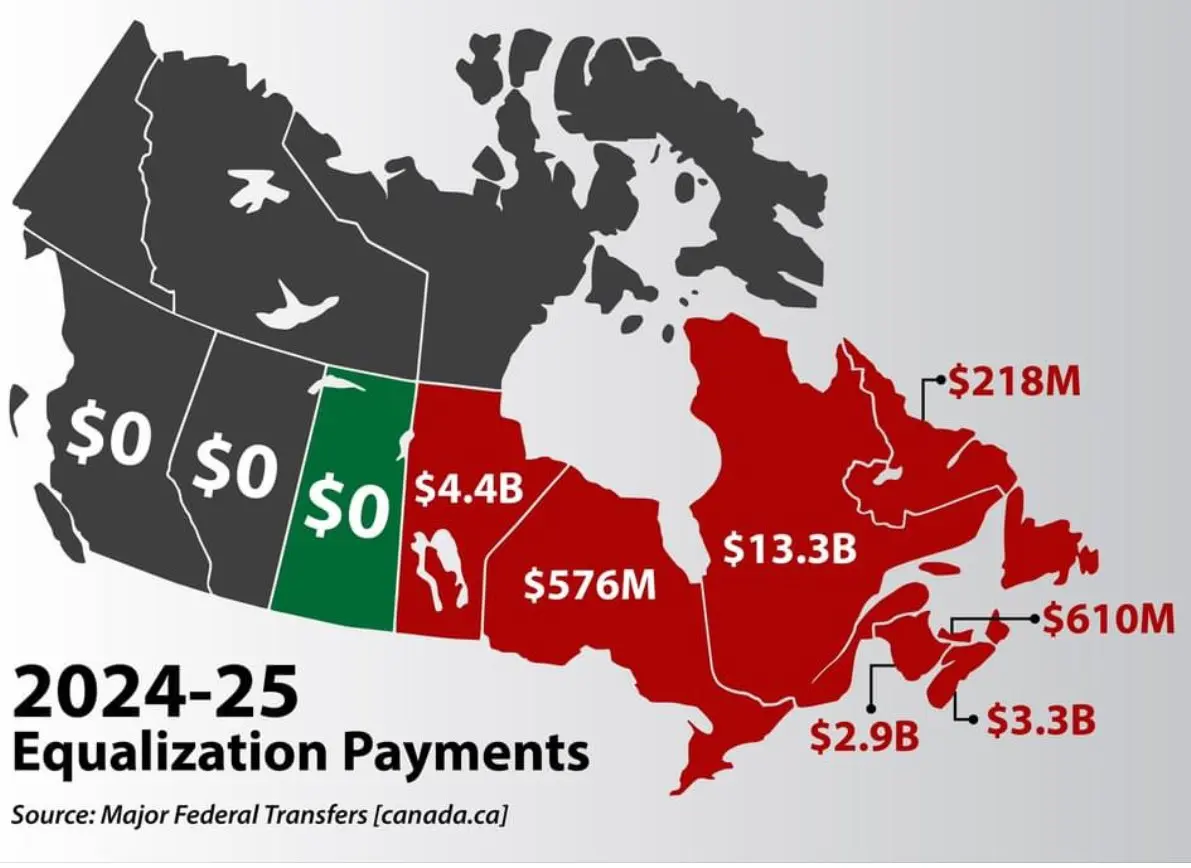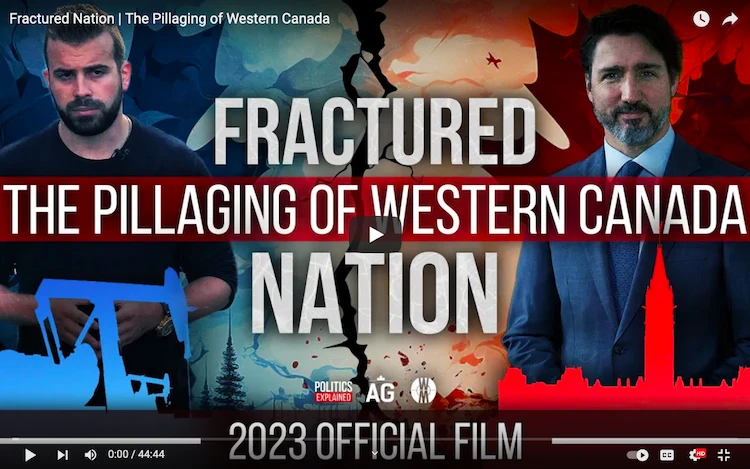No. Your analogy is flawed.’
Income and Global Comparison:
In 2024, the median household income in Quebec stands at approximately $61,400 after taxes. This figure, reflecting the earnings of a typical Quebec family, places them within the top 5-7% of the world’s population in terms of income, according to global economic studies. This data underscores the relative affluence of Quebec families on a global scale (Savvy New Canadians).
Federal Spending and Equalization Payments:
Over the past nine years, the Canadian government borrowed a substantial 1.5 trillion CAD to support various charities (84 000 to 86 000), and an additional up to 1 trillion CAD expansion was borrowed for the 2021 pandemic response. Despite such extensive borrowing and spending, Quebec has received uninterrupted equalization payments for 67 years since 1957. The persistent need for these emergency response payments raises questions about their efficacy and the underlying reasons for Quebec’s financial dependency (Savvy New Canadians).
Quebec’s Housing Market:
Quebec offers some of the most affordable housing in Canada, with the average home price in 2024 being around $488,100 (nesto.ca). Cities like Quebec City, Sherbrooke, Saguenay, and Trois-Rivières feature prominently among the cheapest places to live in the province, with living costs significantly lower than the national average. Compare smaller city opportuniteis with Vancouver, Calgary or Toronto!
For instance, Quebec City has a monthly cost of living around $1,404, making it highly attractive for potential homeowners and renters alike (Savvy New Canadians). This affordability, combined with high income levels, suggests that Quebec residents enjoy a favourable balance between earnings and living costs.
Social Programs and Economic Stability:
Quebec prioritizes extensive social programs, including universal healthcare and affordable childcare. These programs contribute to a high quality of life and economic stability for its residents. Despite these benefits, the province continues to rely heavily on federal equalization payments, which seems incongruent with its relatively high income levels and affordable living conditions and favourable government program supports (Savvy New Canadians).
Critical Analysis of Emergency Payments:
The notion that Quebec’s situation is akin to a family withholding support from its spouse or child is not just flawed — it’s outright ludicrous. For 67 years, Quebec has depended on emergency financial support, like a perpetual financial black hole, sucking in federal aid year after year. No child on Earth gets that treatment (not sure if even a Royal family child gets that eternal support, not sure how that works).
This dependency is nothing short of embarrassing for a province that boasts high incomes and affordable living costs and outstanding economic opportunities in so many sectors like aerospace, electric cars, electric buses, high speed rail, resource export, energy export, and so on (it’s like a Tiger waiting to be unleashed, with powerful French unity and advanced knowledge). It’s time to stop coddling Quebec and start demanding fiscal responsibility and self-sufficiency (Savvy New Canadians).
Neighbour Analogy:
To put it bluntly, suggesting that Quebec’s need for equalization payments is like a family withholding support from its a child or a spouse is absurd. In reality, Quebec and Alberta are more like distant neighbours within the same community or the same municipality or city. Imagine living on a street where one household is constantly borrowing money from other households, despite having a high income and low living costs. The other households work hard to maintain their finances, yet they are expected to continually support this neighbour. This isn’t sustainable or fair. Quebec needs to learn to manage its finances independently, just as any responsible household would.
Now it is not “cold to say“ that the provinces are distant neighbours or close neighbours, to fit your analogy model. This is because, in European understanding, our understanding in Canada as well, a neighbour is someone you safeguard or even love, and this is the foundation of Canada culturally and of Quebec, at least at the 52% level in 2021 (majority and foundational level) still (though was 83% in 1990 and 87% in 1980 as households of Canadian Christian descent or simply the identity).
Unless in recent times, someone bad has changed your understanding of culture, neighbourliness and unity in country is paramount. We defend neighbours against house collapses, earthquakes, invasions etc. It’s our bond of neighbourliness and mutual support and mutual defence. It is only “cold to say” if a person regards the concept of neighbours as something cold.
However, in Canada, if the person is not culturally rooted and regards neighbours as something cold and not part of the same unit of prosperity, not part of the same mutual support in work exchange and idea sharing, and common achievement and common defence – then to these individuals they do not understand the analogy.
In fact, Alberta treats Quebec the traditional way of being a neighbour, according to the highest Canadian Christian identity/European roots neighbour positive quality we have described is the majority pillar in this country still to this day (and even if the equalization payments stopped, it would still meet this definition.. as being a neighbour is not about sending yearly checks, but actions you might take together for well being and safety and sometimes common progress activities.
Resource and Economic Potential:
Quebec possesses immense natural gas reserves and other energy resources, easily 100 years of energy simply on the natural gas alone that they refuse to touch (let alone all the other systems in energy it masters), presenting endless opportunities for technological and manufacturing advancements, and international export to hundred+ countries which will pay Quebec international experts to upgrade their countries to Quebec standard.
These resources can be harnessed to boost not only the provincial economy but also Canada’s position in global markets.
The exploitation of these natural gas reserves, coupled with investment in technology and export capabilities, can transform Quebec into a leading economic powerhouse (especially given their sophistication in industry and technology).
This potential remains largely untapped due to current policies and a reliance on federal support. Embracing these opportunities would allow Quebec to significantly reduce its dependence on equalization payments and contribute more robustly to the national economy (Savvy New Canadians).
Once again, as an obvious example, Quebec has significant undeveloped natural gas reserves that could be exploited, potentially supporting the same type of economic growth seen in Alberta. Reports suggest Quebec’s natural gas reserves are sufficient to meet its demand for over 100 years, providing a substantial opportunity for economic development if policies allow for its extraction (sources: Canada Energy Regulator, Newswire, Canadian Energy Centre).
It is very strange that you see Quebec as a “spouse”, traditionally this was at times not leadership term used in family head, and it is very strange for you to see Quebec as the kid of an unrelated individual thousands of miles away. What kind of disaster do you see in Quebec?!!? That they can’t manage their province!?!?
Conclusion:
Quebec’s strong economic position, bolstered by affordable housing (extremely affordable relative to what is available in Canada per square foot) (every time we checked we say a differential), high incomes, and vast untapped natural resources, and vast infrastructure and technology and manufacturing know-how, makes its continued dependence on federal equalization payments not only unnecessary but also shameful.
Addressing these structural dependencies will not only foster greater regional self-reliance but also contribute to a fairer and more prosperous Canada.
It’s high time Quebec is held to the same standards of fiscal discipline and self-sufficiency as the rest of the nation. By helping to rise Quebec today, it will be much better off when the tough times actually come as part of the “Great Filter” of 2020 to 2050.


@SkillsGapTrain @cnm5000 Title: “Rethinking Canada’s Power Distribution: The Case for Shifting Federal Governance to Calgary”
Note: “Instead of secession, please consider to transfer more national governance power and/or national federal government branch in Calgary.”
Quebec receives significant annual funding yet has failed to capitalize on Bombardier’s immense potential — a company once at the forefront of sectors like electric vehicles, high-speed rail, and passenger aircraft. From a multi-national to a small business private jet company. Way to go Eastern Canada!
This failure is striking, especially considering Bombardier could have positioned Canada alongside global innovators like Tesla and SpaceX.
It seems that Alberta’s hard work of consistent investments to Eastern Canada, aimed at spurring innovation and economic growth have yet to yield proportional national benefits, particularly in Canada’s innovation and stock markets, which have been stagnant since 2010, or sideways while all other business stock markets/innovation economies of other countries have up to the sky for over a decade.
This situation highlights a potential imbalance in regional responsibilities and contributions.
Perhaps it’s time for Alberta to take on a more prominent role in shaping Canada’s future in tech, resources, energy, industry, and agriculture — and even in governance. To reflect this shift, relocating some federal government offices to Calgary, similar to the distribution in Ottawa, ON, and Victoria, BC, could symbolize and support Alberta’s increased leadership role in national affairs.”


Related Content:
Title: “The Hidden Hand: Consulting Firms, Cultural Shifts, and the Erosion of Canadian Sovereignty” x.com/SkillsGapTrain
Title: Unveiling the Fiscal Divide: ‘Fratured Nation’ and the Quest for Economic Autonomy in Canada https://skillsgaptrainer.com/unveiling-the-fiscal-divide-fractured-nation/
Title: “CDN Government gave $1.5 Trillion to Canadian charities over 9 years?” x.com/SkillsGapTrain
Title: “Isn’t it odd how in the United States, a $39 billion investment can draw 600 top technology companies to establish advanced chip factories, whereas in Canada, under the administration of PM Trudeau and Chrystia Freeland, approximately 2.5 trillion CAD has been spent over nine years ($2500 billion CAD)” x.com/SkillsGapTrain
Title: ‘Misguided Climate Policies or Strategic Economic Sabotage? Analyzing the Impact on Canada’s Economic and Environmental Future’ x.com/SkillsGapTrain
Report: “Economic Impact of Blocking Resource and Energy Sectors in Canada“x.com/SkillsGapTrain
Title: “The Great Filter Ahead: Engineering a Pathway to Complex Civilizational Survival and Overcoming Cosmic Hurdles” skillsgaptrainer.com/the-great-filt
Title: @NASA! “Consider setting up shop in Calgary and Montreal to build superior flying wing passenger and cargo planes.” x.com/SkillsGapTrain
Title: “The Sovereign Code: Nigel Farage, Canada’s Rise, and the Blueprint for a Decentralized World” x.com/SkillsGapTrain
Title: “Elon and Valendor’s Visions: Engineering the Future and Fighting for the Next Civilization Amidst the Greatest War” x.com/SkillsGapTrain
Title:“The Truth Behind Modular Housing Policy: Innovation or Imitation? The Public is Led to Believe the First, but SGT Knows It’s the Second“ x.com/SkillsGapTrain
Title: “Which is the country here that has 21st-century tech aspirations to build an advanced energy system, industrial system, and technology system? ” x.com/SkillsGapTrain
Title: “Future by Design: Choosing Livability Over Carbon in the Quest for Sustainable Progress” x.com/SkillsGapTrain
Title: “SGT’s Response to Premier Doug Ford on the EV issue in 2024” x.com/SkillsGapTrain
To see our Donate Page, click https://skillsgaptrainer.com/donate